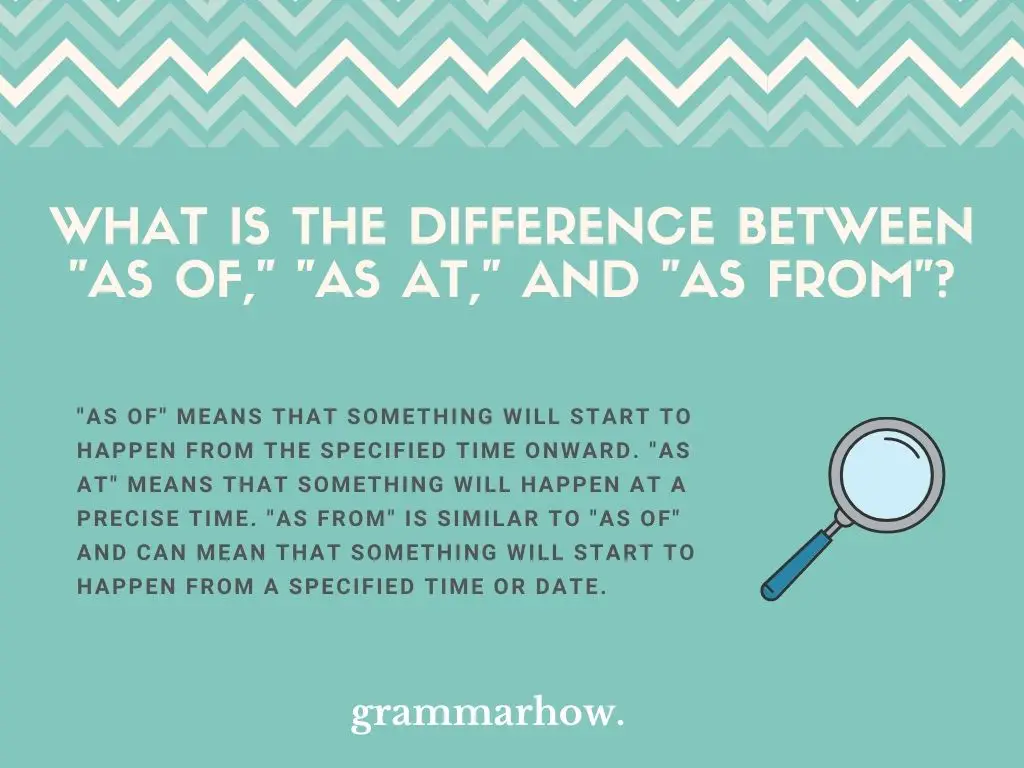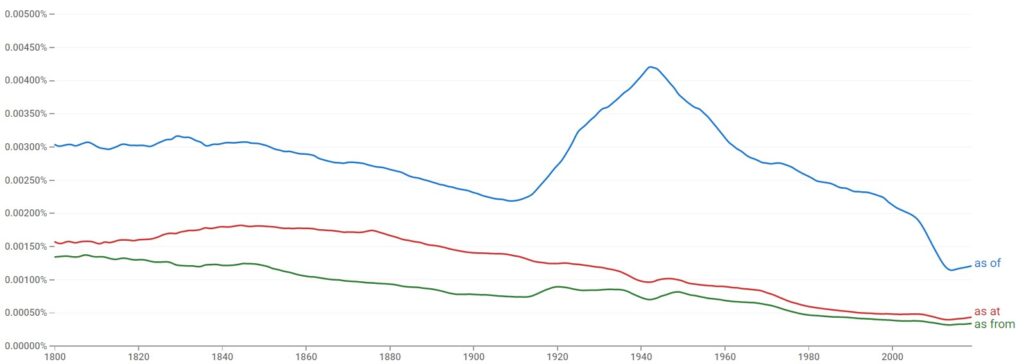The prepositions we can use with “as” all come with slightly different meanings. It would help to know what they all are and what “as of,” “as at,” and “as from” mean. This article will explain them all to you.
What Is The Difference Between “As Of,” “As At,” And “As From”?
“As of” means that something will start to happen from the specified time onward. “As at” means that something will happen at a precise time. “As from” is similar to “as of” and can mean that something will start to happen from a specified time or date.

Typically, “as of” is the most common of the three phrases. You’ll generally find that there are much more contextual uses for it over any of the other phrases.
According to Google Ngram Viewer, “as of” is the most popular choice of the three. “As at” and “as from” are still used, but they’re about as common as each other, and neither comes close to “as of.”

What Does “As Of” Mean?
So, let’s go over the meanings a little more specifically. This might help you to understand how we use them all.
“As of” means that something will start to happen from a particular date or time. It can also mean that something has already started to happen at one point before.
It might refer to the past, present, or future. The context will decide which tense we use:
- Past: As of last week, we had to change the plans.
- Present: As of now, there isn’t much we can do for him.
- Future: As of next week, we will be ending the proceedings for them.
What Does “As At” Mean?
“As at” is less common. It’s also more specific, which is likely why some people avoid using it.
“As at” works only when a specific or precise time is specified. We usually talk about what will happen at that time and when we can expect the thing to happen.
- As at ten o’clock tonight, we will be having a meeting.
Generally, the event with “as at” isn’t ongoing. This is different from “as of” because we use that phrase when something begins to happen and continues into the future.
What Does “As From” Mean?
“As from” is almost identical to “as of.” It’s considered more popular in British English, but we can use it to the same degree.
“As from” means that something is true from a particular point. We can again refer to the past, present, or future of an event. It is a continual change or effect that will take place from that moment on.
- Past: As from the papers I received last week, I have made the appropriate changes.
- Present: As from this moment, we cannot help you any further.
- Future: As from next week, there will be no more meetings to hold.
Generally, people prefer “as of” because it’s the more common of the two. Typically, with prepositional choices like this, we pick our favorites based on what everyone else has decided upon.
Examples Of How To Use “As Of” In A Sentence
Here are some more examples to help you understand the three different phrases:
- As of now, I cannot say any more about the progress.
- As of this moment, there isn’t much left to do.
- As of next week, I will be putting forward new rules and regulations.
- As of tomorrow, we cannot operate this way anymore.
- As of last week, we’ve been made aware of some serious shortcomings.
“As of” works to talk about a continuous event that will happen at some point in the past, present, or future. Generally, that event will continue until told otherwise.
Examples Of How To Use “As At” In A Sentence
- As at ten o’clock, we will be changing the system.
- As at this time next week, a meeting will be held.
- As at Friday, your timesheets will be calculated.
- As at six p.m., no one may leave the building.
- As at tomorrow morning, a meeting will take place.
“As at” is not common, but we can use it to give a precise time when something will take place.
Examples Of How To Use “As From” In A Sentence
- As from next week, I will be looking at your attendance more closely.
- As from this moment, you will have to report to your superiors before every shift.
- As from now, we must move past this.
- As from the email, you will understand what to do with this project.
- As from my letter, they have corrected the problems I raised.
“As from” is synonymous with “as of,” but it’s much less common. You can use it when you want to talk about something happening from a particular time onward.
Is It “As Of Today” Or “As At Today”?
“As of today” is the most common use of the two. We use “as of” to specify the time when an event will continue to take place, and “today” isn’t precise enough to work well with “as at.”
- Correct: As of today, there will be no more meetings.
- Incorrect: As at today, there is nothing left to do.
Is It “As Of Now” Or “As At Now”?
“As of now” is the most common phrase here and the best one to use. We can use “now” to give the specific time when an event will begin to happen and continue into the future. “As at now” does work as “now” is specific, but it’s far less common.
- As of now, we need to share our whereabouts at all times.
- As at now, a meeting will be taking place in the boardroom.
Is It Ever Correct To Use “As On”?
“As on” is correct, but not in the same sense as any of the previous phrases. Instead, when using “as on,” we have to change the meaning of “as” to be similar to “like” or “because.” In this way, we use “as on” to compare two things.
- As on Friday, he failed yet again to make it in on time.

Martin holds a Master’s degree in Finance and International Business. He has six years of experience in professional communication with clients, executives, and colleagues. Furthermore, he has teaching experience from Aarhus University. Martin has been featured as an expert in communication and teaching on Forbes and Shopify. Read more about Martin here.
